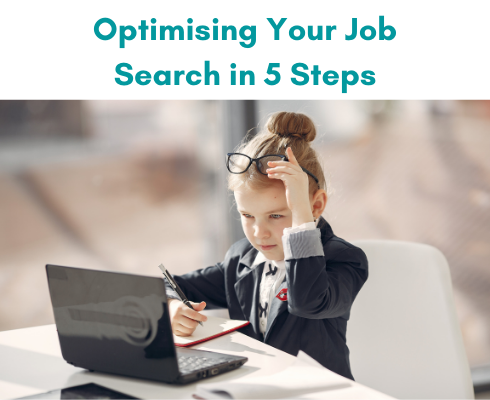
How to Optimise Your Job Search in 5 Steps
The prospect of searching for a new job can be incredibly exciting and promising. For many people, a job isn’t simply a means for a payslip at the end of every month. It’s a source of validation, productivity, positive mental well-being, livelihood, and much more.
Career fulfilment is a goal for a lot of people, and it can take a while to find The One. So, if someone feels stuck in a rut in their current job, the process of job hunting can be an exciting way of revitalising the passion for working and the urge to succeed career goals. This side of the job hunt is great, but it’s no secret that looking for a job is likened to a full-time job. Like a ‘proper’ job, you approach the process with rigour, focus, consistency, and commitment. It takes time – you put the work and the effort into networking, researching, sending emails, sifting through countless job ads, editing your CV multiple times according to the job description, and writing…*shudders* cover letters.
The process of searching and applying for jobs is a bittersweet necessary evil that most of us must do in our adult lives. Whether you’re looking for your first job, you’ve unfortunately been laid off, or you’re looking for a career change, a job hunt doesn’t promise to be easy, but it will be worth it. However, if it is dragging on and edging towards the brink of what your optimism can handle, it can have an adverse effect on your mental wellbeing. This is bound to negatively impact your job search and can even reverse all the progress you’ve made to get to this point in the hunt.
Let’s get into how you can optimise your job search to make the most of the time you have, find you the right role for you, and look after your mental health.
1) Remembering that unemployment does not mean failure
Losing your job or leaving your job can rob a sense of purpose, pride, and motivation. It’s important to remember that not working currently is not synonymous with letting yourself down. If you’re feeling downtrodden and disappointed, you might do well to shift your mindset and view this period of temporarily not working as an opportunity to have more time to yourself, spend time with family, and prepare yourself for your future in a new job. The longer the job hunting process goes on, the more difficult it can be to remain positive, and the disappointment and anxiety can work its way in. This is normal but try to keep it at a healthy level if you can. If it gets overwhelming, it can have an impact on the productivity of your job search, resulting in it taking even longer.
2) Brush up your LinkedIn profile
When 68% of hiring managers consider LinkedIn a necessity and a massive 80% screen candidates on social media prior to hiring them, a job seeker simply can’t afford to be left in the dark. If you don’t have a LinkedIn profile, or you have one that hasn’t been updated in a while, you might not be considered for interview against someone that does.
Start off by:
- Updating your experience
- Accurately updating your skills
- Asking people that you’ve worked with in the past to endorse those skills
- Updating your picture if it needs it
- Utilise the ‘looking for work’ filter on your profile picture
- Outline what you’re looking for in your bio
LinkedIn is a fantastic networking tool – contact people in your space and get your name out there. If you’re sending a connection request to someone, always send a personalised message to give some context. This is a great job search strategy as it builds your network and they’re more likely to reply!
Never underestimate the power of social media. Generally, people want to help people. A simple post stating that you’re looking for work and asking if your network knows of any opportunities in your space will generate traction and get the word out there.
3) Keeping a routine
The sofa seems so appealing when you’re not doing anything in the day. But slipping into a tempting pit of laziness and un-productivity is not going to help you. We know that looking for a job is popularly referred to as a full-time job, so it’s beneficial to approach it as such.
Getting ready, having a coffee, having breakfast, and getting started on work will do a world of good. Alternatively, stick to your normal ‘morning routine’ if you have one. The ‘full-time job’ aspect of looking for a job doesn’t necessarily mean doing the 9-5, it’s more about the commitment, dedication, and focus that it takes. If you do what you can for one day, reward yourself with some well-deserved sofa time. Be honest with yourself about how much you’ve done, though.
4) Setting goals and KPIs
I know, you’ve rolled your eyes at ‘KPIs’. You’re the boss here, so maintaining a ‘work-like’ structure and keeping yourself in check can help keep you in the groove. That means setting goals, tasks, and general things that you want to accomplish. Breaking down what you to day to day into achievable tasks that you can tick off will help boost your productivity and sense of achievement.
Setting goals can help bring structure to your day and keep you motivated, striving towards the end goal of landing a new job. You could set a goal for the number of jobs you want to apply to daily or weekly, the number of people you get in contact with, the number of people you connect with on LinkedIn in your network, and more.
5) Now track the progress
What’s the point in setting goals and KPIs if you don’t track your progress?
To get into real ‘work-mode’, you could even make a spreadsheet indicating all the jobs you’ve applied for, information about the company, whether they’ve got back to you, whether you’ve sent a follow-up email, and so on.
Sometimes, all the companies that you apply for can blur into one. A spreadsheet with information about each company and the contact that you’ve had with them can avoid any embarrassment if they ring you and you’re struggling to pinpoint what they do.
Recording how many companies get back to you and how many interviews you get could be useful, too. The most important thing in this process is keeping your spirits lifted, so keep track of those wins!
Get in touch with ESP!
Our consultants are well known and respected in the technology sales market for their experience, skill, and consultative approach. If you’re interested in contacting a recruitment agency but you’re not sure which one to go with, check out our recent Google reviews for an idea of how our talented consultants handle the recruitment process for our candidates.
We have vacancies in Marketing, Cloud and Managed Services, Cyber Security, and more. Have a browse of our current vacancies and get in touch!



